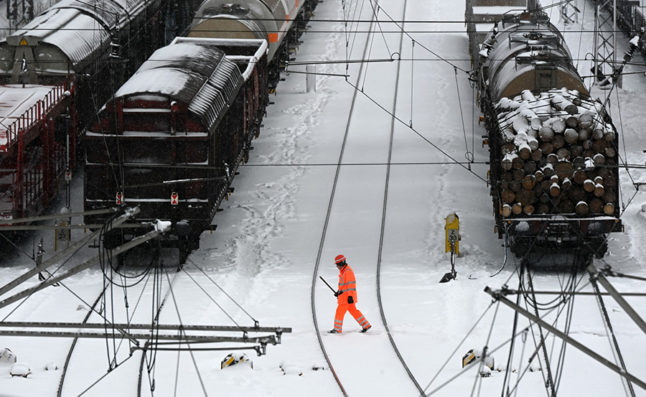The temporary stop to flights on Saturday impacted take-offs and landings at other airports, too.
Anyone due to fly on Sunday should check the status of their flight before travelling.
More than 40 centimetres of snow fell on Saturday, German weather services said, bringing trains in Munich and wider Bavaria to a stop.
READ ALSO: Heavy snow paralyses parts of southern Germany
No trains
Munich main station is expected to remain closed until at least 10am on Sunday, operator Deutsche Bahn said, asking travellers to postpone any non-urgent trips.
The railway wants to get trains up and running again as soon as possible, but this will only be on a few routes in the first instance and there will be fewer trains than normal, a spokesperson told DPA.
Travellers are still likely to face massive disruptions until at least Monday due to damaged infrastructure.
However, transport authorities said that bus, tram and suburban train services in Munich should resume on Sunday.
Traffic returned to normal on the roads in Bavaria overnight, however, with authorities only reporting minor incidents.
“A few trees fell down, but this only caused accidents with car body damage” a spokesman for the Upper Bavaria South police told DPA.
And in Lower Bavaria, a spokesperson said the number of accidents was also “typical for the time of year”.
The police said the night was similarly quiet on the streets in northern Upper Bavaria and Swabia.
Freezing temperatures
The wintry weather didn’t just affect Bavaria either. The weather also impacted road travel in parts of northern Germany with one car in Mecklenburg-Vorpommern coming off a snow-covered road and hitting a tree. The driver and one passenger were seriously injured.
Further snowfall is not expected in most of Bavaria on Sunday, but the Eastern Central Uplands and the Alps may see several centimetres of fresh snow.
Forecasters are predicting lows of -6C to -9C on Sunday.
South of the Danube, temperatures could sink as low as -10C to -15C in some areas.
It’s set to remain cold on Monday and Tuesday with only sporadic snowfall.
It’s a similar picture for other parts of Germany, too: occasional snowfall is expected in Lower Saxony, on the North Sea coast and between the Ore Mountains and the Harz Mountains on Sunday.
On Monday, it’s forecast to turn to rain in those areas, but it should remain dry from Berlin to southern Bavaria.



 Please whitelist us to continue reading.
Please whitelist us to continue reading.
Member comments